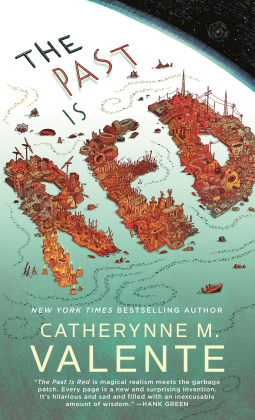Today the Earth is warming. By how much and where the mean final temperature will fall, we don't yet know. Much depends on how we use the decreasing window of action. This, of course, is fodder for science fiction writer. Suppose we fail to act, or fail to act in a timely fashion? Once the floods and wildfires, the population migration and species extinction have run their course, will oceans cover the globe? Might humanity find refuge on floating piles of garbage from centuries of discards?
In this ecodisaster future, warming temperatures and melted
ice have resulted in a global ocean, devoid of solid land. Humans have survived
on floating islands of garbage, arranged during The Great Sorting into various
types. The island called Garbagetown has a district of electronic parts,
Electric City one of expired prescription drugs, and so forth. The unwanted
scraps of civilization provide a life that is at once filled with hope and despair.
Their patron saint is St. Oscar the Grouch.
With a lot of jumping around in time, we follow Tetley
Abednego from an earnest teenager to an adult universally reviled among the
inhabitants of Garbagetown, although we don’t learn what her crime is until
very much later. Any person is allowed to insult or physically assault her,
short of killing her, on a whim, and all she is allowed to say is, “Thank you
for my correction.” Her romance with Goodnight Moon leads to the revelation of
a desperate scheme that will either bring the inhabitants of Garbagetown to dry
land or destroy their future forever. Added to that, a strange device
discovered in the mounds of discards comes to life with equally unexpected
results.
Valente’s imagination never fails to bring to life worlds
and peoples that are both fantastical and touchingly familiar. Despite the
warning of a world in which melted ice has swelled the endless oceans, her characters
embody hope and the human capacity to find joy and love even in the most depressing
times. On the other hand, I had difficulty with the casual cruelty of
Garbagetown inhabitants toward Tetley, especially before I had the context to
understand the impact of what she had done. The jumping around in time confused
me in places. But these objections pale beside the entirety of the story:
endlessly inventive, often humorous, occasionally tragic, always hopeful.
The Ice Lion, by Kathleen O'Neal Gear (DAW)
What a topical book! In the far future, the grand attempt to halt the Earth’s runaway warming has met with equal disaster. The result was a new and apocalyptic Ice Age with glaciers three miles high and a poisonous slime, “zyme” covering the oceans. As the planet descended into this frigid nightmare, the last scientists recreated species that had survived earlier Ice Ages: dire wolves, helmeted musk oxen, cave lions, and extinct, archaic human species like the Denisovans (distant relatives of Neanderthals) and Homo erectus. As the planet grows even colder, tribes of these hominids vie for territory and food.
Against this background, two teenaged friends, hunter Quiller and visionary Lynx navigate an increasingly hostile terrain. The cold seasons are growing ever longer and the “Rust People” more dangerous. When Lynx goes off on his marriage honeymoon and the camp is attacked by lions, he freezes. As a result, his new bride is killed and he is sentenced to exile and a spiritual journey to confront the mythic giant ice lion. Instead, he encounters an aged shaman who just might be the last of the true humans. Quiller, who has secretly been in love with Lynx, must choose between following him to defend him against the dangers of the wilderness and joining the fight to preserve her tribe.
This book, the first of “The Rewilding Reports” has many strengths. Prose that melts away, leaving the reader immersed in the story; a wealth of sensory detail that bring the world to vivid life; compelling characters and relationships; skillful clues and escalating revelations. The end marks a partial resting place where the drama of this first adventure is resolved but the characters still face ongoing danger and mysteries yet unsolved. Despite the bleakness of this future, the all-too-human denizens move forward with hope, joy in one another, and awesome competence.
A final word: There is apparently a new genre or subgenre of literature called "cli-fi." These two certainly fit, although I find the term unfortunately suggestive of something else.


No comments:
Post a Comment